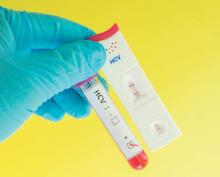A 12-week course of elbasvir plus grazoprevir proved effective against hepatitis C virus in 301 patients who were receiving opioid agonist therapy for injectable drug addiction, according to a report published online August 8 in Annals of Internal Medicine.
This patient population showed excellent treatment adherence and achieved sustained virologic response (SVR) rates of approximately 90%, even though most participants continued to use injectable drugs during the study. These findings demonstrate that current drug users can achieve HCV treatment outcomes that are comparable to those in the general HCV population, and “suggest that access to interferon-free direct-acting antiviral therapy should be expanded to patients receiving opioid agonist therapy, including the removal of drug use-based restrictions,” said Gregory J. Dore, MD, of the Kirby Institute, University of New South Wales, Sydney, and his associates.
They assessed elbasvir-grazoprevir (Zepatier) treatment in patients with untreated chronic HCV who were aged 18 and older and had been receiving opioid agonist therapy with methadone, buprenorphine, or buprenorphine-naloxone for at least 3 months at facilities in 13 countries. The study participants were randomly assigned in double-blind fashion to receive either immediate active treatment for 12 weeks (201 patients) or matching placebo for 12 weeks followed by 4 weeks of follow-up followed by deferred open-label active treatment for 12 weeks (100 control subjects).
All patients were followed for 6 months after they completed active treatment. All underwent frequent urine testing for illegal drugs, and more than half of both study groups tested positive for at least one drug during active treatment and follow-up. Illegal drug use was stable throughout the study period and did not affect either treatment adherence or efficacy. Nearly every participant showed excellent adherence (over 95%) to elbasvir-grazoprevir.
The primary efficacy endpoint, the SVR rate immediately after active treatment, was 91.5% in the immediate-treatment group and 89.5% in the deferred-treatment group. Both rates are substantially higher than the historical reference SVR rate of 67%, Dr. Dore and his associates noted (Ann Intern Med. 2016 Aug 8. doi: 10.7326/M16-0816).
Elbasvir-grazoprevir was equally effective against the GT1a, GT1b, and GT4 strains of HCV, but was less effective against the GT6 strain, which occurs primarily in China and Southeast Asia. It also was effective across important subgroups of patients, including those who had cirrhosis and those who carried HCV variants associated with drug resistance.
Regarding treatment safety, the rate of serious adverse events was low in both study groups (3.5% and 4.0%, respectively), and only one event in each group was deemed to be related to elbasvir-grazoprevir.
The incidence of reinfection for the 24-week period after successful treatment was 4.6 per 100 person-years, and it often was attributed to continuing use of contaminated needles or sexual contact with an infected partner. The effect of reinfection is “of considerable clinical and public health interest,” and will be further examined during a 3-year extension of the follow-up of this study, the investigators said.
“Of interest, 3 of the 6 patients categorized as having HCV reinfection subsequently had undetectable HCV-RNA levels without additional HCV treatment, indicating that not all reinfection cases develop viral persistence,” they added.
This study was funded primarily by Merck, which markets Zepatier. Dr. Dore reported ties to AbbVie, Merck, Bristol-Myers Squibb, Janssen, Roche, Gilead, GlaxoSmithKline, and Abbott, and his associates reported ties to numerous industry sources.


